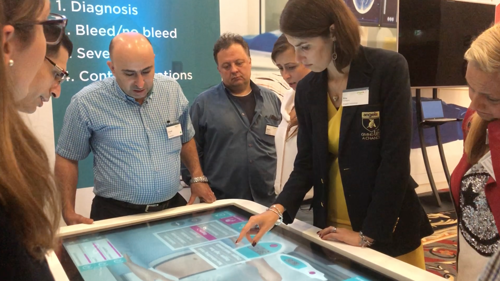Stroke care: sharing the recipe for better outcomes
Consider this: 1 in 4 people will suffer a stroke in their life, if it is not you it could be any of your friends and family.
Stroke outcomes can depend on which hospital the patient is admitted to. If the hospital is ‘stroke ready’, a multi-disciplinary team will quickly assess and treat the patient in line with defined protocols. This gives the patient the best chance possible of returning to the life they knew before their stroke.
If you are treated in the wrong hospital, you have a higher risk of dying or being permanently disabled. At the moment, for most stoke victims, this is a lottery.
Stroke is a heavy burden for survivors and families. There is also an economic toll. Stroke costs Europe around €64 billion euro – but this can be significantly reduced through optimal care: severe stroke is five times as expensive to treat than mild or moderate stroke.
The Angels Initiative improves stroke care and therefore saves lives and prevents catastrophic disability. It helps to build up more and better stroke-ready hospitals by
- building acute stroke networks
- optimizing stroke diagnosis and treatment
- implementing best practices
- integrating existing networks by working in partnership with the European Stroke Organisation (ESO), the World Stroke Organisation (WSO), the Stroke Alliance for Europe (SAFE) and many national stroke societies and other companies.
The initiative was first launched in developing countries – South Africa and India – where fewer than 1% of patients receive guideline-recommended treatment. However, close examination of the situation in developed countries revealed surprising gaps in European stroke care. In fact, just one in three stroke sufferers in Europe are treated in a stroke unit. One in three!
‘The Angels Initiative sends consultants to hospitals to understand what they need to become stroke ready. Then they work with the hospital to optimize the care they provide,’ says Valeria Caso, European Stroke Organisation. In May the Angels Initiative achieved it’s goal of creating a network of 1,500 hospitals which are stroke-ready.
Collaboration is at the heart of initiative, in the sense that it does not look at single elements of a disease. Instead, partners working together to address acute stroke treatment as a unit. The active participation of pharmaceutical companies, notably Boehringer Ingelheim, and technology start-ups such as Brainomix, ensures access to expertise and innovation. Brainomix offers its AI-based software to participating hospitals free of charge for six months. The system, which can detect stroke damage on CT scans of the brain, can be used to inform clinical decisions and to train doctors to interpret scans.
Michalis Papadakis of Brainomix says hundreds of hospitals have already taken the no-strings-attached offer to use the system. ‘Hospitals who have used it see the value of the software for training and in the clinical pathway,’ he said. ‘It gives them confidence to make faster and better treatment decisions.’

‘Patients can ask informed questions about their specific needs and prepare for the future,’ she says. ‘Communication is a two-way process: both sides can influence the outcomes of treatment and how patients fare when they leave the hospital.’
Looking ahead, Angels will continue to push for more and better stroke units across the world. It has, says Jelena, become bigger than a short-term initiative to address inequality of outcome: ‘This is not a project, it’s a movement.’